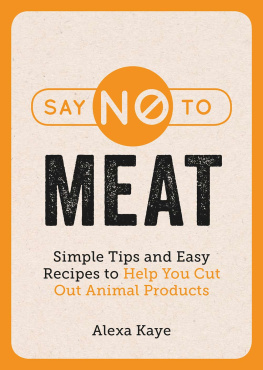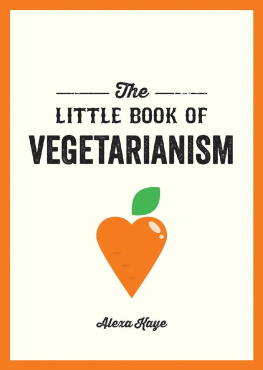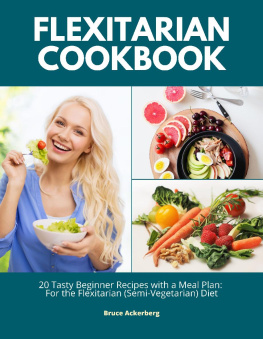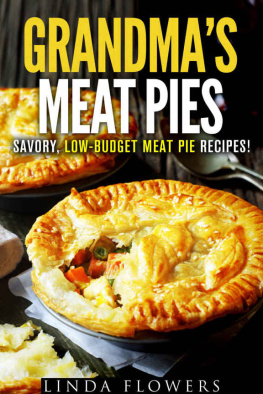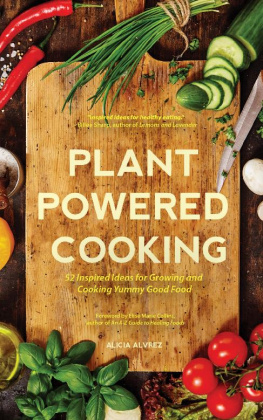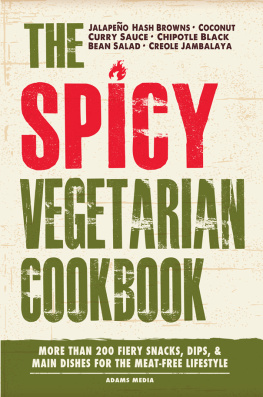SAY NO TO MEAT
Copyright Summersdale Publishers Ltd, 2019
Text by Abi McMahon
All rights reserved.
No part of this book may be reproduced by any means, nor transmitted, nor translated into a machine language, without the written permission of the publishers.
Condition of Sale
This book is sold subject to the condition that it shall not, by way of trade or otherwise, be lent, resold, hired out or otherwise circulated in any form of binding or cover other than that in which it is published and without a similar condition including this condition being imposed on the subsequent purchaser.
An Hachette UK Company
www.hachette.co.uk
Summersdale Publishers Ltd
Part of Octopus Publishing Group Limited
Carmelite House
50 Victoria Embankment
LONDON
EC4Y 0DZ
UK
www.summersdale.com
eISBN: 978-1-78783-457-6
Substantial discounts on bulk quantities of Summersdale books are available to corporations, professional associations and other organizations. For details contact general enquiries: telephone: +44 (0) 1243 771107 or email: .
Disclaimer
Neither the author nor the publisher can be held responsible for any loss or claim arising out of the use, or misuse, of the suggestions made herein.
Whats so Bad about Meat?
Its never been easier to reduce the amount of meat and fish you consume. Its also never been more important that you do so. Gone are the days of nut roasts and limited menu options. We are enjoying a meat-free heyday, blessed by a cornucopia of supermarket meat alternatives and vegetarian restaurants.
The world has changed and the way we produce meat has changed too. We are no longer hunting our food or even farming on a local level. The animal agriculture business is global and its consumption is massive. Animal agriculture gobbles up land and water and produces enormous quantities of greenhouse gases, causing serious strain on our environment. The United Nations has projected that our global population will have swollen to 9 billion by 2050 and that we could need three planets worth of resources to maintain that population with our current lifestyles.
With the massive technological progress made in food production, including the ability to create alternative meat products that look and taste like animal meat, many people believe that it isnt ethically acceptable to kill animals for food. If you have the option to eat healthily and sustainably and not kill an animal, doesnt it make sense to take it?
Whatever your reason, this book contains masses of information to help you take the first steps towards cutting meat from your diet. Look for the symbols below to see how each tip can help you.
KEY
 | This is an inexpensive way to cut out animal products |
 | This option involves a new way to do things |
 | This tip includes a meat replacement idea |
 | This option reduces the amount of meat you consume |
 | This option is for those who have mastered the basics |
Some types of meat carry health risks when consumed in large quantities. Studies have linked eating a lot of processed and red meat with an increased chance of developing bowel cancer. Around 34,000 cancer deaths a year can be linked to diets rich in processed meat.

Studies show that people who follow a plant-based diet can experience health benefits including a lower risk of heart disease, lower cholesterol levels and a reduced risk of some types of prostate and breast cancer.
Some types of meat are more environmentally friendly than others. Gram for gram, chicken farming produces three to ten times less greenhouse gas emissions than beef, in part due to the large rate of methane emissions from cows. If youre looking to reduce your impact on the environment, but are scared of going totally meat free all in one go, you can start making a difference by swapping your beef burger for chicken.

Meat consumption has rocketed over recent decades. The worldwide consumption of meat in 1960 was around 7 million metric tons. The global consumption of meat today is closer to 30 million metric tons.

Animal agriculture consumes a vast amount of water. It can take up to 683 gallons of water to produce 1 gallon of milk, and 2,400 gallons of water to produce 1 pound of beef. By comparison it takes only 244 gallons of water to produce 1 pound of tofu, a traditional Asian food made from soy beans that has become a popular vegan meat alternative.
THE GLOBAL ANIMAL AGRICULTURAL BUSINESS PRODUCES MORE GREENHOUSE GASES THAN THE WORLDS CARS, BUSES, PLANES, TRAINS AND OTHER TRANSPORTATION SYSTEMS COMBINED.
According to the United Nations nearly 90 per cent of the worlds fishing spots are overfished. Even farmed fish feed on wild fish caught from the sea it takes over a kilo of wild fish to produce only 400 g of salmon.
THE NUMBER OF FISH IN THE OCEAN HAS REDUCED BY HALF SINCE 1970 AND AROUND 80 PER CENT OF COMMERCIAL FISH SPECIES HAVE DISAPPEARED AS A RESULT OF OVERFISHING.
COMMERCIAL FISHING IS ALSO RESPONSIBLE FOR THE DEATH OF THE MANY ANIMALS IT CATCHES ACCIDENTALLY, SUCH AS DOLPHINS, TURTLES AND SHARKS.

Bottom trawling the commercial fishing technique of dragging heavily weighted nets across the ocean floor is responsible for much of fishings destruction of marine environments. Modern heavyweight trawler nets destroy thriving coral beds, depriving ocean creatures of their habitat. In some areas, such as the coral seamounts off Southern Australia, nearly 90 per cent of the coral beds are reduced to rock.
Scientists have estimated that we will run out of all seafood by 2050 if the current rate of overfishing continues.
WHERE TO START
Well done! Youve taken the first step by deciding to make a positive choice in your life and reduce your meat consumption. So whats next? Its OK to start small and make just one change in fact that can be the best way to form lasting habits. Here are a few methods and techniques to help you reduce your meat consumption in an easy and sustainable way.


